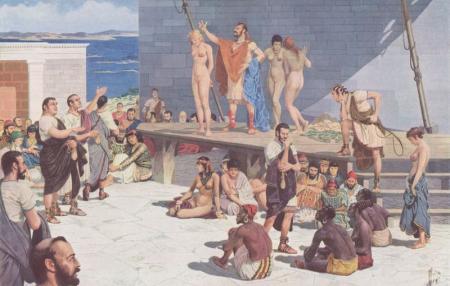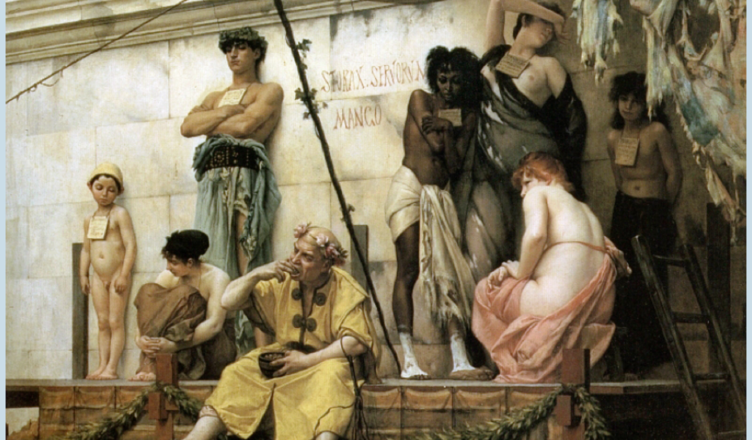 This post is part of a brief series which gives a brief overview of the images of salvation.
This post is part of a brief series which gives a brief overview of the images of salvation.
In this post we consider the image of the Slave Market.
Normally we think of property as possessions, animals, houses and land (Job 42.12). In the world of the scriptures people can be thought of as property as well (Dt 5.21; Jon 4.11). Slaves are people who are owned by others. They are the property of their masters. Sometimes people sold themselves into slavery to pay off some sort of debt.
In slave markets people are purchased and sold for a price. Slavery was found in the ancient Near East, the Graeco-Roman world, and the Old and New Testaments. No single description of slavery fits the various forms it took in the ancient world.

“The most common terms for slaves in Hebrew and Greek refer to both slaves and servants. A frequent term for slave in Hebrew is derived from the verb “to work” or “to serve.” This term does not seem to convey the negative and derogatory association that it does in Greek usage outside the Bible.
In Hebrew, no distinction is made between an Israelite and a non-Israelite slave, as the same term is used to describe both of them.
Slavery existed in most cultures in the ancient world and in all the cultures surrounding the land of Israel during biblical times.
Slavery could take the form of debt slavery, in which people sold themselves or their children to clear their debts, punishment for crime, the birth of children to slaves, and the enslavement of victims of piracy or war.
Many slaves in the ancient Near East had been prisoners of war. Others sold themselves or their children into slavery in order to pay their debts. The state was seldom strong enough to effectively supervise large number of slaves. Thus, many were semi-free and worked as serfs on state and temple estates, or as domestic slaves in wealthier households. This required less supervision. Others were true slaves—often branded to be easily identified as such—and could be bought, sold, transferred by inheritance, etc.
Beginning with Exodus, slavery is the primary human condition from which God releases His people. God’s liberation of the Israelites from enslavement in Egypt becomes the paradigmatic experience of God’s justice and compassion, as seen in the prologue to the Ten Commandments: “I am the Lord your God, who brought you out of Egypt, out of the land of slavery” (Exod 20:2; Newsom et al., Women’s Bible Commentary, 34). Decrees that involve slavery are thus sensitive to the fact that the Israelites had been enslaved in Egypt. However, slavery as such is not questioned. Instead, the relationship between the Israelites and God is described as a new slavery—one with positive connotations: “For the children of Israel are my slaves; they are my slaves whom I brought out of the land of Egypt. I am the Lord your God” (Lev 25:55).
The Old Testament seems to assume that slavery is part of the human experience and provides the Israelites with regulations for slavery. Concern is shown for the welfare of slaves, especially Israelite slaves—the Mosaic law promoted mild treatment of slaves (e.g., Exod 21:20; 21:26–27; Deut 5:14). An increasing concern for Israelites is also evident, and a distinction is thus made between Israelite and non-Israelite slaves. For example, Lev 25:39–41 states that an Israelite who sells himself into slavery due to poverty shall be released in the Year of Jubilee (while Exod 21:2–3 says that the manumission, or formal emancipation, should take place after six years of service). Leviticus 25:44–46 states that non-Israelite slaves could be held permanently and inherited by one’s children. There are also instructions to redeem Israelite slaves that are owned by non-Israelites (Lev 25:47–51).” (Nässelqvist, D. & Jardim, G., 2016. Slavery J. D. Barry et al., eds. The Lexham Bible Dictionary.)
As we have seen in many of my posts. Slaves are purchased and redeemed by their new master and king. The purchase price Christ’s very own blood. Those purchased by God become part of his kingdom and serve him as his slaves and servants.
Our new master God is the one true King. He has justified his people from the dominion and slavery of Sin. We now serve him.
Examples
The most significant example is Israel’s exodus from slavery in Egypt. For a bit of context.
21 And the Lord said to Moses, “When you go back to Egypt, see that you do before Pharaoh all the miracles that I have put in your power. But I will harden his heart, so that he will not let the people go. 22 Then you shall say to Pharaoh, ‘Thus says the Lord, Israel is my firstborn son, 23 and I say to you, “Let my son go that he may serve me.” If you refuse to let him go, behold, I will kill your firstborn son.’ ” (Ex 4.21-23)
The LORD issued the command to Pharaoh in Egypt to free his firstborn son Israel and warned him that if they did not free Israel he would kill their firstborn sons. The LORD explains what he will do further on.
2 God spoke to Moses and said to him, “I am the Lord. 3 I appeared to Abraham, to Isaac, and to Jacob, as God Almighty, but by my name the Lord I did not make myself known to them. 4 I also established my covenant with them to give them the land of Canaan, the land in which they lived as sojourners. 5 Moreover, I have heard the groaning of the people of Israel whom the Egyptians hold as slaves, and I have remembered my covenant. 6 Say therefore to the people of Israel, ‘I am the Lord, and I will bring you out from under the burdens of the Egyptians, and I will deliver you from slavery to them, and I will redeem you with an outstretched arm and with great acts of judgment. 7 I will take you to be my people, and I will be your God, and you shall know that I am the Lord your God, who has brought you out from under the burdens of the Egyptians. 8 I will bring you into the land that I swore to give to Abraham, to Isaac, and to Jacob. I will give it to you for a possession. I am the Lord.’ ” (Ex 6.2-8)
The LORD describes his saving action in freeing Israel from slavery as redemption. After God redeems Israel He commands Israel to remember his mighty work by redeeming their own firstborn sons.
11 “When the Lord brings you into the land of the Canaanites, as he swore to you and your fathers, and shall give it to you, 12 you shall set apart to the Lord all that first opens the womb. All the firstborn of your animals that are males shall be the Lord’s. 13 Every firstborn of a donkey you shall redeem with a lamb, or if you will not redeem it you shall break its neck. Every firstborn of man among your sons you shall redeem.
14 And when in time to come your son asks you, ‘What does this mean?’ you shall say to him, ‘By a strong hand the Lord brought us out of Egypt, from the house of slavery. 15 For when Pharaoh stubbornly refused to let us go, the Lord killed all the firstborn in the land of Egypt, both the firstborn of man and the firstborn of animals. Therefore I sacrifice to the Lord all the males that first open the womb, but all the firstborn of my sons I redeem.’ 16 It shall be as a mark on your hand or frontlets between your eyes, for by a strong hand the Lord brought us out of Egypt.” (Ex 13.11-16)
It’s little surprise then, that when Paul describes the work of Christ in setting his people right with God, he describes it in terms of redemption.
21 But now the righteousness of God has been manifested apart from the law, although the Law and the Prophets bear witness to it— 22 the righteousness of God through faith in Jesus Christ for all who believe. For there is no distinction: 23 for fall have sinned and fall short of the glory of God, 24 and are justified by his grace as a gift, through the redemption that is in Christ Jesus (Rom 3.21-24)
Paul is echoing the whole exodus narrative when he uses this word.
In the Gospel Jesus describes his own death on the cross as a ‘ransom’.
42 And Jesus called them to him and said to them, “You know that those who are considered rulers of the Gentiles lord it over them, and their great ones exercise authority over them. 43 But it shall not be so among you. But whoever would be great among you must be your servant, 44 and whoever would be first among you must be slave of all. 45 For even the Son of Man came not to be served but to serve, and to give his life as a ransom for many.” (Mk 10.42-45)
A ‘ransom’ is a payment used to purchase slaves. Likewise in Peter’s first epistle.
14 As obedient children, do not be conformed to the passions of your former ignorance, 15 but as he who called you is holy, you also be holy in all your conduct, 16 since it is written, “You shall be holy, for I am holy.” 17 And if you call on him as Father who judges impartially according to each one’s deeds, conduct yourselves with fear throughout the time of your exile, 18 knowing that you were ransomed from the futile ways inherited from your forefathers, not with perishable things such as silver or gold, 19 but with the precious blood of Christ, like that of a lamb without blemish or spot. (1 Pet 1.14-19)
Paul on occasion highlights his understanding of Jesus’ death as a form of payment that purchased his people for God.
18 Flee from sexual immorality. Every other sin a person commits is outside the body, but the sexually immoral person sins against his own body. 19 Or do you not know that your body is a temple of the Holy Spirit within you, whom you have from God? You are not your own, 20 for you were bought with a price. So glorify God in your body. (1 Cor 6.18-20)
The change in ownership has moral implications for how God’s people must live now.
13 Christ redeemed us from the curse of the law by becoming a curse for us—for it is written, “Cursed is everyone who is hanged on a tree”— 14 so that in Christ Jesus the blessing of Abraham might come to the Gentiles, so that we might receive the promised Spirit5 through faith. (Gal 3.13-14)
Paul here refers to redemption again in the context of Christ’s death.
With respect to justification, Rom 3.24 (‘redemption’); 6.6-9 (‘set free’) and Acts 13.37-39 (‘freed from everything’) use this kind of imagery.
6 We know that our old self was crucified with him in order that the body of sin might be brought to nothing, so that we would no longer be enslaved to sin. 7 For one who has died has been set free [justified] from sin. 8 Now if we have died with Christ, we believe that we will also live with him. 9 We know that Christ, being raised from the dead, will never die again; death no longer has dominion over him. 10 For the death he died he died to sin, once for all, but the life he lives he lives to God. (Rom 6:6–10)
Again, see the being set free from slavery allusions in Paul’s thought.
Copyright © Joshua Washington and thescripturesays, 2016. All Rights Reserved.





